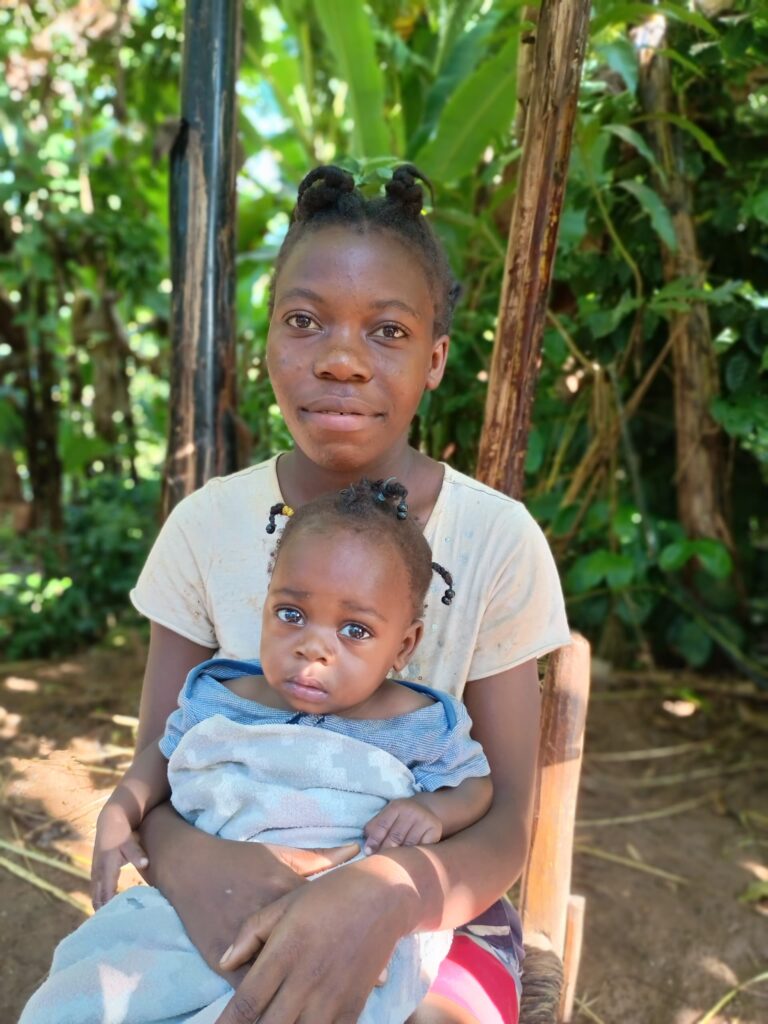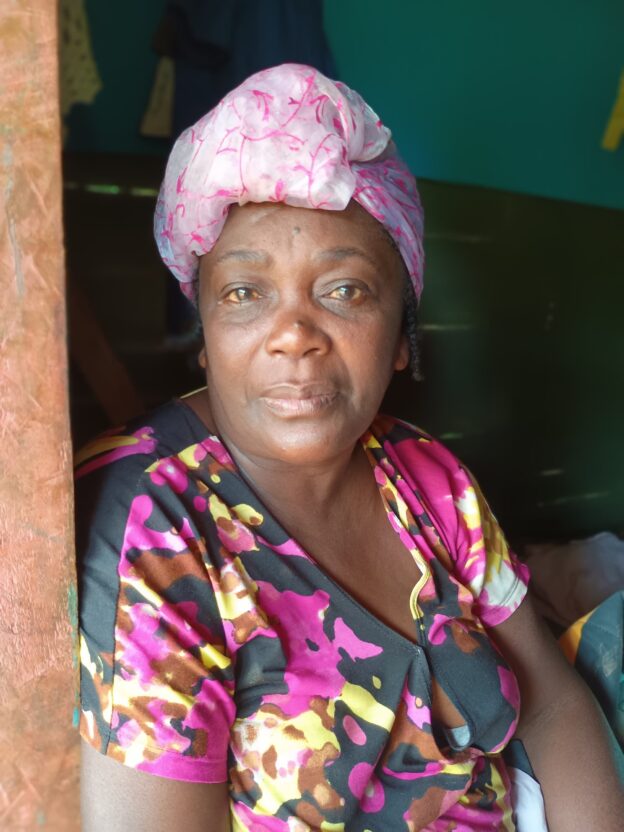Marie lives in a small house in Gwo Lyann, a neighborhood along the ridge that runs east from Gwo Moulen towards Bwa. Wouj, the market near the top of the neighboring hill. Until 2022, she and her family were living a very different life from the one they live now.
He husband, Prophete, is a farmer, and she both farmed with him and earned money separately through small trading. She would buy merchandise — mostly basic groceries — down in Laskawobas or Bwa Wouj and sell them in Gwo Moulen. She sometimes earned additional income by making sweets that she could sell to school children, who liked them as an inexpensive school-time snack. She also knows how to sew, and though she doesn’t have her own machine, she would sometimes use one at her sister’s house. The couple’s younger children were in school. Two were getting ready to take the national 9th-grade graduation exam.
But one day, she was preparing to do her wash at the water source down below her home. She had been filling five-gallon buckets of water, one after another, because she did not like have to stop to get more water once she started the laundry. She had made hot chocolate for the kids, and sent them off to school. Suddenly, her foot slipped out of her plastic sandal, and she felt a sharp pain in the sole. That pain quickly was shooting up her leg. She fought her way through the rest of her laundry, but when she was ready to hike back up the path to get home, she needed help to get there.
Though she wasn’t sure what had happened, she initially hoped the pain would pass. Going to see a doctor is not a small matter when you live where she lives. There are no roads that lead to Gwo Moulen, the central community in the area, that even a motorcycle can travel. Under the best of circumstances, a healthy young person needs at least two hours to hike up from Laskawobas, where there is a hospital. The hike down might seem easier, but it is steep and rocky in places, so for someone struggling it, too, is worth trying to avoid.
By the time Marie and her family decided that she really had to see someone, she could not walk at all. They made a stretcher for her, and carried her all the way down. She went to the hospital in Laskawobas, which referred her to the larger teaching hospital in Mibalè. There she learned that she had diabetes. Doctors advised amputation, but she and her family decided against it. They couldn’t imagine how she would function at home in Gwo Lyann with just one leg. They carried her back up the hill, and she’s been spending her days sitting just inside the doorpost of her home ever since. Between the loss of all her income and the family’s declining harvests, Marie and her family have spent the years since then just getting poorer and poorer. Prophete earns money selling day labor in their neighbors’ fields, and the school in Gwo Moulen sometimes sends them food from what it prepares for the children at lunch.
At the beginning of June, Marie joined the CLM program.The couple began receiving their weekly cash stipend, and that has helped a little with daily expenses. When it was time for Marie to receive the funds earmarked for her to build income, she and Prophete made a plan. She gave him the 15,000 gourds, and he bought two goats in the central market in Laskawobas. After paying for their purchase papers, the ropes to keep them tied, and a cheap meal to give him the strength to hike back home, Prophete returned with 600 gourds that the couple used for two very small, young hens. They are now waiting to receive the balance of the investment fund. Members generally receive the funds in two payments. Marie and Prophete already have a plan. They would like to add a pig and a turkey to their collection of livestock.
And Marie is thinking about how to get back into to commerce as well. She thinks she could sell groceries out of her home. She’ll just need to depend on Prophete and others to hike off to do her buying. But she thinks that will take more cash than she has right now. On the other hand, she could re-start her business making and selling sweets with much less. She imagines that 5,000 gourds would be enough, and she is now considering a loan from her VSLA as a way to get started.

Marie lives just east of Gwo Moulen, and Rosemitha lives just west of it.
Rosemitha and her mother, who is also a CLM member, have been living there since her father died and her mother moved in with another man. Rosemitha is her mother’s youngest, and her stepfather raised her his own child. “Our relationship has always been good, and I think it always will be good.”
She was a schoolgirl, getting ready to take her 9th-grade graduation exam, when she was raped by a man visiting from the Dominican Republic. He immediately went back to the D. R. She was three months pregnant by the time she took the exam. She passed the exam, but gave up the idea of continuing in school in order to care for her child.
She, her mother, and her stepfather all earn money in their neighbors’ fields. A day of work pays 200 – 250 gourds, less than $2. There are five of them in the home, plus Rosemitha’s baby, because her mother is raising two of her brother’s children. “When there’s food in the home, we have plenty to eat. But we live with whatever we have.” When they can make enough helping others farm, they can use some of the cash they earn to plant their own fields as well. That helps a lot. But everything depends on the days of field labor they are able to sell.
Things have gotten a little bit easier since she and her mother joined the program, but not a lot. While they have been receiving their stipend, they are reluctant to spend very much of it. “If someone comes along to help you,” Rosemitha explains, “you have to help yourself as well.” They buy food with some of the stipend, but they try to save some of it as well. After six meetings of her VSLA, Rosemitha already has 2,700 gourds saved. And she has come to see that she could have been saving all along. She could have worked to put away even a small portion of her earnings from farmwork. But the VSLA has made it easier. “It pressures you to save.”
She used the first portion of her investment fund to buy two goats and a turkey. They are the animals, she says, that are easiest to care for. She hopes to buy more poultry with the balance of her investment fund when she receives it. She would like eventually to start a small commerce, too, but she wats to wait until her baby less dependent on her being there to nurse.
